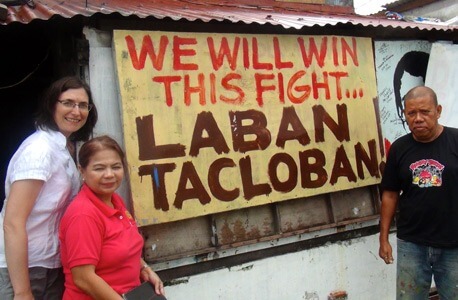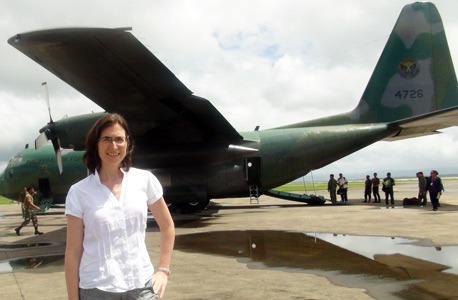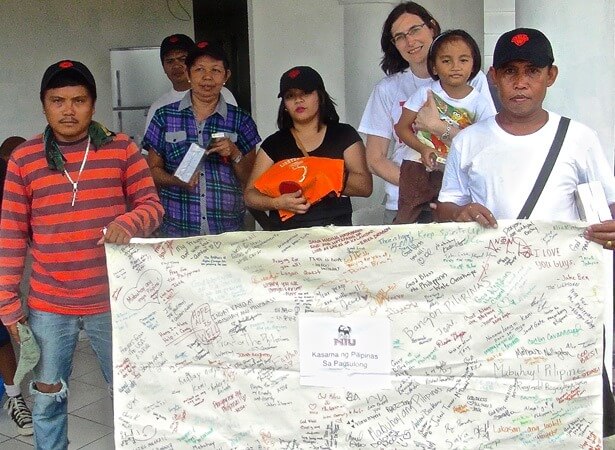
Katharine Wiegele (right) poses in Tacloban City with fisherman Rodrigo Enico (far left) and his family during the boat blessing and handover in Tacloban City. Enico’s motorboat was named after DeKalb resident and donor Jennifer Mescher, a childhood friend of Wiegele. Enico’s livelihood has always been fishing but until now he did not have a boat of his own. “It took Typhoon Haiyan for me to have my own boat,” he said.
NIU adjunct anthropology professor Katharine Wiegele took a cue from the old saw: “Give a man a fish and you feed him for a day; teach a man to fish and you feed him for a lifetime.”
Only Wiegele went the extra mile – or make that about 8,200 miles.
She worked with family, friends, colleagues and NIU students to raise enough funds to purchase supplies and three fishing boats for victims of Typhoon Haiyan, which devastated the Philippines in November.
Then, while doing anthropological research last month in the Philippines, Wiegele helped personally present the boats to families in Tacloban City, in the country’s central region.
Typhoon Haiyan was the deadliest typhoon ever to hit the Philippines, and among the strongest ever recorded. The violent storm left more than 6,000 dead, and thousands more displaced. Tacloban City was among the areas worst hit.
Wiegele said that one of the fishermen who received a boat had a particularly tragic story. He and his wife and their four children took refuge during the storm on the rooftop of their home. They were separated in a rush of seawater.
When the waters receded, the man’s 11-year-old son was discovered nearby clinging to the top of a coconut tree. The man’s wife and three other children were never found.
“The fishermen were extremely grateful for the boats, but they are still dealing with the tragedy of their own personal losses,” Wiegele said. “People there are still in shock. They have no homes, most have lost family members or friends, and they don’t have jobs.”
Wiegele’s efforts began late last year. After the typhoon hit, she started collecting relief funds from her Facebook friends. Then she teamed up with Rhodalyne Gallo-Crail, an NIU instructor of Tagalog, one of the major languages spoken in the Philippines.
Gallo-Crail’s Tagalog classes – both in the fall and spring semesters – conducted bake sales with proceeds going to Wiegele’s disaster-aid fund.
“In class, I always try to make connections to the country and Filipino culture,” said Gallo-Crail, who is a native of the Philippines.
“After the typhoon, news media were reporting regularly on the Philippines, and I recognized a service opportunity for my students,” she said. “Helping typhoon victims allowed them to learn more about the country and engage them in the needs of its people after the disaster. It also enriched my students in terms of developing personal responsibility for improving the world.”
Wiegele has had a close connection to the Philippines dating back to her service there in the Peace Corps during the 1980s. At that time, she became friends with the family of former Filipino senator Manuel Manahan. The family later founded the Manuel P. Manahan Foundation, a Filipino NGO.
Wiegele gave the $1,000 that she and students had collected to the foundation, which used the money to provide food, medicine and other supplies to disaster victims. Some of the funds were also used to purchase toys for children at Christmastime. The foundation’s work attracted Filipino news coverage, which made mention of NIU’s “baking class” contribution.
Prior to her March 10 through April 14 research trip, Wiegele raised another $2,000 for the foundation – enough to purchase the three motorized boats. The foundation kicked in the additional funds needed to fully equip the boats with nets, goggles and other fishing gear.
Wiegele’s main purpose in the Philippines was to investigate the cultural models of nature for fishermen along the shores of the Verde Island Passage in Batangas Province, an area of the Philippines that is among the world’s richest in marine diversity. The research is part of a large-scale National Science Foundation-funded effort led by NIU Presidential Research Professor Giovanni Bennardo.
Halfway through her field research in Batangas, Wiegele met up with representatives of the Manahan Foundation in Manila, boarded a C-130 cargo plane and traveled to typhoon ravaged Tacloban City to present the boats.
The boats were named after those who had made the most significant donations, including one called “Jenny” after DeKalb resident Jennifer Mescher, a friend of Wiegele who also has hosted young people from Southeast Asia during leadership-training programs at NIU.
“What’s great about this effort is that we were able to provide boats and equipment directly to families in need,” Wiegele said, adding that Tacloban City remains devastated.

Katharine Wiegele with Muffet Manahan of the Manahan Foundation (in red) and Cesar Cayanong (right), the artist who painted the new boats. He painted slogans such as these around the city after the storm, many of which were picked up by national and international press.
She saw mass graves, large ships run aground and people still living under tarps amidst rubble.
“There’s still a broad region of devastation, but people don’t want to leave their property because property titles have been lost. Building is still restricted, presumably so people don’t build on land that is not theirs,” she said. “Most of the city is dark at night because electricity has been reestablished only along the main roads.”
Wiegele and Gallo-Crail are continuing their local fundraising efforts.
Gallo-Crail and her Tagalog students held another bake sale this month. This summer, she and three of her students – Isabelle Squires, Carlo Aseron and Rachael Horvath – will visit the Philippines for language study. They hope to do some work for the Manahan Foundation and hand deliver the latest donations.
“My students are hoping to intern with the foundation so they can create some visibility for the organization by developing a website that would provide a way to connect the foundation with some of our friends and students at NIU,” Gallo-Crail said.
Anyone interested in making a donation can contact Wiegele at wiegele@niu.edu.


